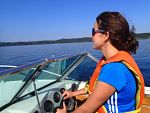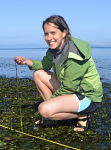Maya Groner’s current research focuses on the ecology and evolution of marine and freshwater diseases. She is especially interested in the interactions between aquatic diseases and community structure, life history and climate change. Her research employees a wide variety of tools including mathematical models, lab experiments, field surveys and genomics.
Currently her work focuses on two disease systems, sea lice parasites of salmonids, and wasting disease (caused by the protist Labyrinthula zosterae) in eelgrass.
Current sea lice projects include investigating the epidemiology of sea lice infestations on wild and farmed salmon, understanding factors that influence the evolution of resistance to parasiticides in sea lice, and modeling integrated pest management strategies for improved control of sea lice on salmon farms.
 Current projects in eelgrass wasting disease include identification of factors (environmental and biotic) associated with wasting disease prevalence in eastern Canada and the Pacific NW, investigating the role of climate change in eelgrass wasting disease and developing a forecasting tool to predict eelgrass wasting disease.
Current projects in eelgrass wasting disease include identification of factors (environmental and biotic) associated with wasting disease prevalence in eastern Canada and the Pacific NW, investigating the role of climate change in eelgrass wasting disease and developing a forecasting tool to predict eelgrass wasting disease.
Dr. Groner’s postdoctoral advisors are Drs. Mark Fast and Crawford Revie and she is also a member of the Research Coordination Network on the ecology of infectious marine diseases led by Dr. Drew Harvell.
Maya Groner received a Ph.D. in ecology and evolutionary biology from the University of Pittsburgh in 2011 under the supervision of Dr. Rick Relyea.
More information about her research can be found at mayagroner.weebly.com.


